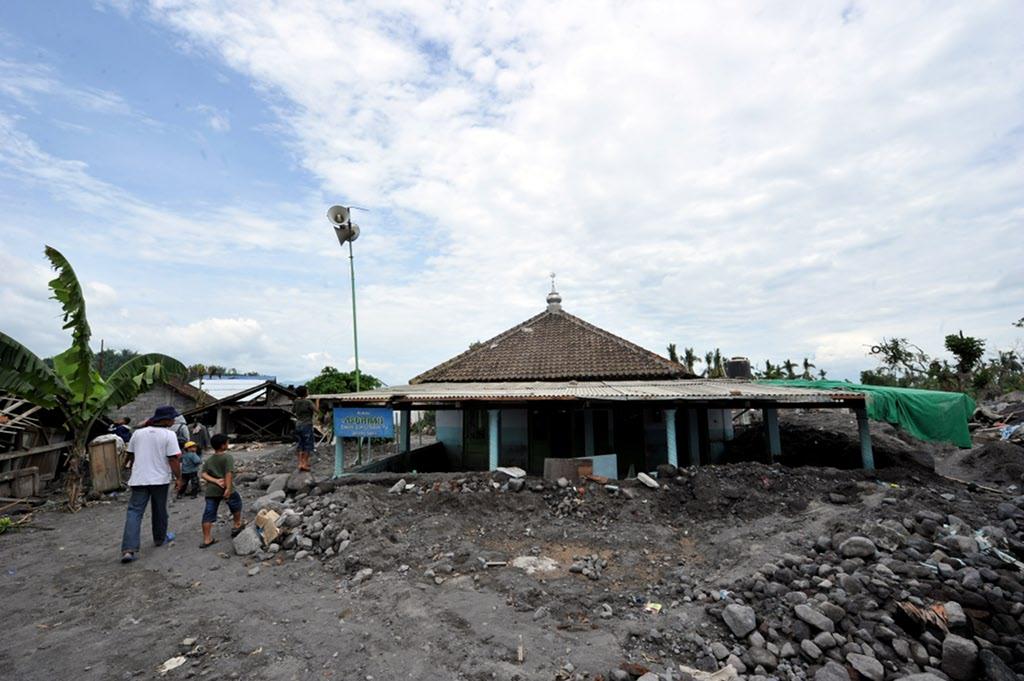Multiple disasters strike Indonesia
Houses buried under volcanic debris stand in Jumoyo, Magelang in Central Java on January 30, 2011. At least one hundred houses were swept away or buried by volcanic mudflow following heavy rains that carried debris from Merapi volcano. Disaster management officials said they had recorded 353 deaths and many of those were buried under fast-flowing torrents of boiling hot gas and rock that incinerated villages on the southern slopes when the volcano exploded on November 5, its biggest eruption in over a century.
Top News: The Indonesian government scrambled to provide rescue and relief after two major natural disasters struck within hours of each other on opposite sides of the country on Oct. 25 and 26, killing hundreds of people and displacing tens of thousands more.
The first disaster was an earthquake-triggered tsunami that hit the isolated Mentawai islands off the west coast of Sumatra on the night of Oct. 25. Around 20 hours later, the famed Mount Merapi volcano in Central Java province erupted after rumbling for nearly a week, spewing two massive and deadly heat clouds.
Disaster relief officials were struggling to evacuate the wounded from Mentawai Island due to heavy rains and rough seas and care for more than 70,000 displaced people in Central Java who were evacuated from the Mount Merapi area after several subsequent eruptions. More than 400 people were killed in the tsunami, while the death toll from Mount Merapi's eruption has so far killed more than 120.
President Susilo Bambang Yudhoyono assured the international community on Nov. 1 that there would be no immunity for army soldiers involved in the grisly torture of two men in Indonesia’s restive Papua region shown in a video posted on YouTube.
The shocking video emerged on Oct. 16, sparking widespread condemnation from human rights groups, which noted the Indonesian military’s history of human rights abuses in trying to quell a small insurgency in Papua that dates back to the 1960s.
After remaining silent about the torture video for days, Indonesian government officials admitted on Oct. 22 the tape was real and its soldiers were involved. Yudhoyono then ordered an investigation and said any guilty military personnel could be court-martialed.
Indonesia’s much-publicized battle against corruption appears to have lost ground in the past year following the release of a new survey showing graft in state bodies is worse than in 2009.
The independent Corruption Eradication Commission on Nov. 1 released the results of its survey, in which more than 12,000 citizens were polled on their experiences in being forced to pay bribes in exchange for government services. Meanwhile, the latest Transparency International Corruption Perception Index, released globally on Oct. 26, showed that Indonesia had not improved from 2009.
While sweeping to re-election in July 2009 on an anti-corruption platform, Yudhoyono has been widely criticized for not directly confronting anti-reform elements within the national police, house of representatives and the judiciary.
Money: Sending a ripple of terror through both the tobacco and media advertising industries, Indonesian Health Minister Endang Rahayu revealed on Oct. 22 that a government decree was being drafted that will ban or severely restrict cigarette ads in one of the world’s biggest markets.
More than 65 million Indonesians are smokers, and the country’s lucrative tobacco industry produced 245 billion cigarettes in 2009. The industry is backed by a shadowy lobbying effort that woos lawmakers and government officials to keep the industry free from regulation.
Will the next neighborhood Walmart be in Jakarta? The world’s largest retailer has joined the race to buy Indonesian retailer Matahari’s hypermarket chain in a deal that could surpass $1 billion, according to media reports on Nov. 4.
More than a decade after pulling out of Indonesia, Walmart wants back in given the success in Indonesia of French retailer Carrefour, and has reportedly hired Barclays Capital to advise on the deal.
The competition is tough, however. Both South Korea’s Lotte Shopping and U.S. private equity firm Carlyle are also in the bidding for Matahari’s Hyper-Mart stores, which is the second-largest chain in the country.
State-owned Krakatau Steel exceeded all expectations with a much-anticipated initial public offering that ended on Nov. 4, raising more than $300 million by selling a 20 percent equity stake. The country’s predominant steelmaker trumpeted its success by announcing the same day that it had completed the first stage of its expansion plans and added 15 percent capacity.
However, the company and the Indonesian government came under immediate fire from lawmakers who vowed to launch a corruption investigation on the grounds that the 850 rupiah share price was far too low.
Elsewhere: Despite moves by political parties to ban their lawmakers from taking taxpayer-funded overseas “study trips” amid growing public outrage, two delegations quietly flew out of Indonesia on Oct. 31 and Nov. 1 for separate trips to East Asia and Russia.
Parliament is considered Indonesia’s most corrupt institution, with several current and former lawmakers in prison for graft and the former members of an entire commission being investigated for taking bribes.
Every day, reporters and producers at The World are hard at work bringing you human-centered news from across the globe. But we can’t do it without you. We need your support to ensure we can continue this work for another year.
Make a gift today, and you’ll help us unlock a matching gift of $67,000!
